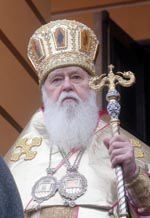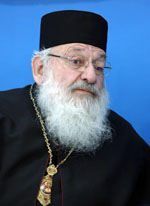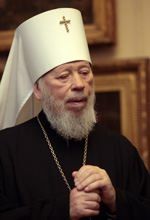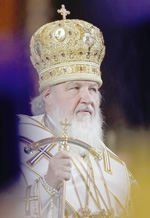“Patriarch Kirill, supporting the actions of the Russian authorities on the territory of the CIS, proposed the creation of a common civilizational space known as Russkii Mir – the Russian World – on the territory of the former Russian Empire. Ukraine holds a key place for the successful implementation of this concept. According to the patriarch, Kyiv was the first ‘to unite the lands of Rus’, unite the isolated tribes, and introduce Christianity in Rus’.’ ‘Ukraine must keep up these traditions,’ believes Patriarch Kirill. The Russian Church has long been trying to subordinate all Orthodox churches in Ukraine,” reads an article by Bartlomiej Czescik on the Polish non-governmental Foreign Affairs Portal (PSZ.PL).
By the way, Ukraine’s President Viktor Yanukovych recently got an award from Kirill, Patriarch of Moscow and All Rus’, and became the first Ukrainian winner of Patriarch Aleksii II Prize “For outstanding activities in strengthening the unity of Orthodox nations — for establishing and promoting Christian values in social life.” The monetary equivalent of the prize is 50,000 dollars.
The problems of interaction of the authorities and church, the influence of the Russian Orthodox Church (ROC) on Ukrainian churches, as well as the state of Orthodoxy in general — these were the issues covered in The Day’s interview with Professor Oleksandr SAHAN, Ph.D.
“PRESSURE ONLY MAKES A CHURCH STRONGER”
Dr. Sahan, given the disunity in Ukrainian Orthodoxy and constant complaints from the Ukrainian Orthodox Church of Kyiv Patriarchate (UOC KP), Ukrainian Autocephalous Orthodox Church (UAOC), and Ukrainian Greek Catholic Church (UGCC) about the oppression from the regime and the Ukrainian Orthodox Church Moscow Patriarchate (UOC MP), what is the significance of an award for “uniting Orthodox nations”?
“You should really ask the representatives of the Moscow Patriarchate. I guess this was a way for ROC to praise the contribution made by Yanukovych and his team to the cause of unification of two Orthodox nations — Russian and Ukrainian. As for the money, it seems that the president gave it to some orphanages.”
But what about the millions of Ukrainians who attend the churches of UOC KP, UAOC, and UGCC?
“The very notion of an ‘Orthodox nation’ is very vulnerable. If 52 percent of all the religious organizations in Ukraine are Orthodox organizations, can we really speak about an ‘Orthodox nation?’ Or, if the prize is awarded for unity, what is the essence of this unification? What are its qualitative characteristics? These questions remain open.”
Bishop Yevstratii (Zoria) of UOC KP believes that this prize should be awarded “for the strengthening of unity of Orthodox nations with the Moscow Patriarchate.” What do you think?
“He might be right, since the prize was awarded by the Moscow Patriarchate, which means that it commended a contribution made to the ROC, and no one else.”
By the way, the initiative to award this prize belongs to Kateryna Samoilyk, member of the Communist Party of Ukraine.
“Samoilyk has long been trying to address the problems of Orthodoxy. Five or six years ago I even drew up a critique of her approaches to interpreting these problems. We know that the Communist party has symbolically repented for its crimes against the faithful (as if this act could somehow acquit the communists of the thousands of executed priests, destroyed churches, or orphaned children!). Therefore nowadays the phrase ‘an Orthodox communist,’ which in the Soviet times was just an oxymoron, has become reality.
“Yet how are we then supposed to perceive the communist doctrine, which was based on the principles of atheism? Has thus everything written by the classics of Marxism been revised? It’s a common knowledge that the communist doctrine was based on anti-religious principles. However, today we see a combination of two ideologies which are incompatible by definition. This is called political conjuncture. The more so that the Moscow Orthodoxy often turns out to be an ideological basis for political activities, including those of the communists.”
Patriarch Filaret of Kyiv and All Rus’-Ukraine stated that Moscow’s ultimate goal is the destruction of the Kyiv Patriarchate, and reducing it to the level of a marginal, irrelevant structure. What do you think of it?
“I haven’t seen any Moscow documents testifying to this, but there are commonly known facts which support Patriarch Filaret’s statements. There are seizures of churches by raiders in central and eastern Ukraine, priests summoned to ‘ideological’ interviews with government officials, and the like. The masterminds of this pressure on the UOC KP have a poor knowledge of history. We all remember that in The Days of Kuchma’s presidency there were also attempts to somehow subdue the UOC KP and stop its development. It eventually resulted in the opposite — because, as a rule, pressure makes all manner of adventurers and hacks leave the church, while spiritual preachers and true leaders remain, and they considerably increase the parish. Pressure only makes a church stronger.
“Coercive methods create an opposite effect, because political laws do not always work in religion: religion is a much more complex phenomenon than some politicians might think. Raising taxes forced entrepreneurs to go to the Maidan, believers have sacrificed their lives for their religious convictions at all times.”
“THE MOSCOW CLERICS FROM THE UOC MP ARE BUILDING UP THEIR INFLUENCE OVER UKRAINE”
As a believer, Yanukovych certainly has a right to attend any church of his choice, but as president he must treat all churches with equal respect. However we see that the regime has a privileged church, i.e., the UOC MP. Why is that so?
“The president’s entourage once explained that he belonged to a certain church, and would therefore maintain specific relations with the UOC MP. However, traditionally in Ukraine there has existed a different pattern of relations between the heads of state and churches. All the three predecessors of Yanukovych, despite being parishioners of a certain church, met with the leaders of other churches as well. Besides, they would meet with the All-Ukraine Council of Churches and Religious Organizations, which unites almost 95 percent of Ukraine’s religious organizations. There also are other interfaith associations.
“Meanwhile, during the year of Yanukovych’s presidency there has been no interaction between the leadership and churches, with the exception of UOC MP. It suggests a certain deliberate attitude: a certain church is favored and claims to have a special status, while the others risk being reduced to secondary. Yet the Constitution and laws say something different…”
Surprisingly, during the presidency of Viktor Yushchenko (who was in no particular favor with Moscow, to put it mildly), the Moscow Patriarchate treated the UOC KP differently. Now that Ukraine-Russia relations have improved, the pressure on the UOC KP has increased. Why is it so?
“From 1990 to 2008, the Patriarch of Moscow never visited Ukraine a single time. It was one of the factors of the formation of the so-called broad autonomy, which began to take shape. Yet in 2009, the UOC MP got a new patriarch and he visited Ukraine four times. The visits appeared to be pastoral, but they are to a certain degree a form of control over what is going on in Ukraine. This affects the perception the status of the Ukrainian church.
“We have all heard the semi-facetious statement about the transferring of the Moscow Patriarchate headquarters to Kyiv. This gives food to thought, as there is some truth behind every joke. This is a manifestation of certain processes as seen from Moscow. The other constituents of this pressure are the changes made on February 4, 2011, by the Council of Bishops of the ROC, to the Statute of Church: they, too, prepare the ground for further ‘canonical’ limitation of the rights of the UOC MP’s broad autonomy.
“Nowadays in Ukraine we can observe the growing influence of individuals who have openly opposed the broad autonomy of the UOC, carried out anti-Ukrainian, chauvinistic policy against the Ukrainian history, culture, and language. They began to determine the policy of the UOC MP in Ukraine. We know their sentiments, and this is extremely worrying. Moreover, these individuals declare that they are the clerics of no other but the Moscow Patriarchate.
“By the way, there was a time when they would reproach journalists for dubbing them as UOC MP, because UOC was the legal name, while the prefix MP was incorrect. They said it should not be used. Today no one feels hurt by it, moreover, they even make a point of emphasizing the MP. This is done in order to fasten the bonds between the Ukrainian Church and the Moscow Patriarchate.”
What are they after?
“I guess they aim to limit the broad autonomy, and autonomy in general. Although you fairly well understand that this is a conventional status, canonically, it is not fixed anywhere: UOC MP has no tomos [a special church decree granting autonomy. — Ed.] to state that this church is autonomous — it is not registered in the diptych of autonomous churches, and is perceived by the world’s Orthodoxy as merely a part of the Moscow Patriarchate. Yet there are attempts to liquidate even this status and reduce it to an exarchate of the Moscow Patriarchate in Ukraine. These desires, as far as I can see and track the situation, are not so concealed by many of those public figures and clerics, who allow the abuse of the Ukrainian language and culture on their websites. All round, they consider the independence of Ukraine to be one big mistake.”
How can we oppose this?
“If each of us, let alone officials, did their own job in their own place, and was aware of being a patriot and a citizen, in charge of the country’s future — I think this would be enough. At the moment we are facing our eternal Ukrainian problem: mimicry. Too many people are beginning to adapt to the situation, or keep silent at best.”
“THE INITIATIVE OF UNIFICATION OF UKRAINIAN CHURCHES MUST BE A GRASSROOT ISSUE”
How do you see the solution to the problem of unity of Ukrainian Orthodoxy?
“Unless there is a nationwide awareness of the vital urgency of unification (without which the independence of the Ukrainian state remains under threat), no political force or church will do it. The previous president is known to have tried to speak of a local church, but no progress was made in this direction. The moving force was essentially wrong: unification was perceived as carried out ‘from above.’ So, numerous clerics (including outright Ukraine-haters) were showered with dozens of awards and other decorations; foreign patriarchs were invited; and some obligations and promises were made… It all cost a pretty penny. Yet the faithful, both supporters of the Moscow and Kyiv Patriarchates, were never able to understand why they had to unite with their ideological opponents (this is how the division line between the UOC MP and the UOC KP runs nowadays).
“[Instead] it should be a grassroots movement. And this takes feature films, documentaries, articles, TV discussions between experts (not politicos), etc. Ukrainians must become aware of the idea that without a local Church a powerful Ukrainian state is impossible.”
Looks like there are enough problems both at the top and at the bottom…
“Over more than 300 years of presence of the Moscow Patriarchate in Ukraine, it has brought up quite a few Ukrainians who cannot imagine themselves outside the ROC. Besides, almost eight million ethnic Russians are now living in Ukraine, who often do not know or accept Ukrainian, especially in the divine service. Therefore the problem of division of Orthodoxy in Ukraine is indeed not that of ‘canonic’ of the UOC KP or the UAOC. It is a matter of antagonistic ideologies. If a person does not want to live in the independent Ukrainian state, he or she will never attend the UOC KP or UAOC.
“On the other hand, around 60 or 70 percent of those who attend the churches of the UOC MP are people with a Ukrainian mentality, mostly Ukrainian-speaking, and who, according to sociological data, sympathize with the idea of a local Church. In western and central oblasts of Ukraine they are even raising the question of conducting the divine mass in Ukrainian. Therefore it is essential that Ukrainians know the true history (instead of the false Muscovite-Soviet variations) of Orthodoxy in Ukraine. They must get rid of the stereotype of being inferior or non-competitive, which is imposed on them.
“Clearly, the Moscow Patriarchate has its own plans concerning Ukraine; it is trying to impose pro-Muscovite convictions, the Russian language, culture, etc. (its own ‘Russian World’). And it has truly great resources for this, not least because a church is, by definition, a powerful educational institution. Thus, in Ukraine a parallel educational influence is being exerted upon students (with the help of the education ministry, which has adopted the line of Russification, closing Ukrainian-language schools, and ‘writing textbooks jointly with the Russians’) and upon believers (via Sunday schools and homilies, which more often than not will feature Russian ‘scare stories’ and myths concerning Ukraine’s history, since the history of Ukraine is intrinsically interwoven with that of Ukrainian Orthodoxy). If this is not stopped, Ukraine will cease to exist as state in another generation. And it is only a local Ukrainian Orthodox Church that can put an end to this state of things.”
The Ukrainian Constitution maintains that church is separated from state. Why do clericals get involved in power?
“The borderline is very flimsy. The church as an institution is indeed separated from the state, but not the believers. Each cleric or believer is a citizen of Ukraine, thus their civil rights to elect and be elected must be guaranteed. Another thing is that bishops or priests will often try hard to cash in on their social status. They just forget, so to speak, to change from their cassocks when they go to the polling booths.”
“BELIEVERS EXPECT TO HEAR PRIESTS TALK ABOUT ACTUAL LIFE”
During one of Patriarch Kirill’s visits to Ukraine a reporter’s camera caught the patriarch’s Breguet watch (worth around 30,000 euros). They have already started the construction of the Holy Resurrection Cathedral of UOC MP in Kyiv. It is to become the tallest Orthodox church in Europe, with a height of 120 meters. It will be a huge complex with a total area of 22,000 square meters. According to the designers, it will comprise, besides a temple accommodating 5,000 parishioners, the metropolitan’s residence, numerous offices, a classical school, a center for spiritual education, a hotel for pilgrims, a TV studio, a conference room for a thousand people, a sports complex, and an underground parking for 126 vehicles. Is this the crisis of Orthodoxy?
“Here a question suggests itself: are the existing churches of Kyiv crowded? Unfortunately, in this country the construction of temples is turning into a profitable business. On the other hand, Orthodox Christians are often resentful of Protestants, who have ‘captured’ the radio and television. But who prevents the Orthodox from doing the same?
“In my opinion, an ordinary church would suffice, rather than the tallest in Europe, and the rest of the money could be used for missionary activities, creating radio and TV programs, and the improvement of the Glas (Voice) channel, which nowadays deals with culture studies rather than religious issues. Believers expect to hear priests talk of actual life situations, self-education, their first steps in the church, etc., rather than lecture their parish.
“The absence of such work on the part of our priests has resulted in Ukraine becoming one vast ‘training ground’ for missionaries from all over the world. We already have more than one hundred religious denominations, and their numbers will only increase. For instance, Sunday Adelaja has come from Africa, where Christianity appeared hundreds of years later than in Ukraine. And he will teach Ukrainians about Christianity. This absurdity testifies to the fact that Ukrainian churches lack a strong theological and missionary school. People attend the gatherings of Adelaja and his ilk because they have nowhere else to go to listen to a priest. Orthodox churches have 22-40 Sunday schools per 100 parishes, while each charismatic community has one or two Sunday groups. So why should we be surprised that over the recent decade the number of charismatic churches has doubled?
“Under tsarism, all government officials were forced to adopt Orthodox Christianity, while priests’ children virtually had no other choice than go to a theological seminary. This boosted atheism and eventually resulted in the Bolshevik revolution of 1917. Nowadays, Orthodoxy is making the same mistake, trying to get preferential treatment from the state and penetrate power structures. For the church it can become another catastrophe.”
The church should free souls, and instead it wants to rule them.
“We should proceed from the work done on increasing the number of believers. It is sufficient to take a look at several different churches on a Saturday or Sunday and see how many young people there are and if they are filled, after all. Then you will have an insight into the development of religion in Ukraine.
“Today we have oblasts boasting of being Orthodox, while they have actually long become Protestant, like Donetsk oblast. That is because among Russified Ukrainians, separated from their nation, the Protestants can do particularly well. On the other hand, it also shows that people cannot get answers to their questions in Orthodox churches.”
What threats to Orthodoxy does this show?
“The objective process shows that if the trend continues, literally in another generation’s lifetime (15-20 years) the Orthodox Church will no longer be the largest in Ukraine.”
How does this compare with the situation in Russia?
“In Russia, these tendencies have existed for a long time. The renowned Moscow researcher of religious processes Ekaterina Elbakian writes that in today’s Russia the Orthodox church is one of the most publicized institutions of the state. It is highly integrated into the state, that provides the patriarch with bodyguards and vehicles. The patriarchy is already putting forward demands as to what believers are to wear. By hook or by crook, it has wriggled into lay education. But what are the results? Over the last 5-6 years the numbers of believers coming to churches at Christmas has sunk by half.
“The situation in Kyiv is somewhat better at present. But will it last long? The influence of the Russian Church on Ukrainian society increases indifference toward Orthodoxy. Here is just one noteworthy fact: at the meeting with the Pope in ‘Orthodox’ Kyiv there were ten times more people than at similar meetings with the Patriarch of Moscow. And what about last year’s flop in the ‘ultra-Orthodox’ Odesa, where only a couple thousand believers convened to greet the patriarch? This ‘voting with one’s feet’ also gives a telltale answer to the question of distant prospects of Russian Orthodoxy as a whole and in Ukraine in particular.”
COMMENTARIES
The Most Holy FILARET (born Mykhailo DENYSENKO), Patriarch of Kyiv and All Rus’-Ukraine:
“Despite the appeals, the president never met with the All-Ukraine Council of Churches and Religious Organizations in 2010. Thus we can say that there is no valid dialog between the authorities and the religious denominations, with the exception of the Moscow Patriarchate. I am convinced that this is totally wrong, and the state will come to realize it sooner or later, because in Ukraine the Moscow Patriarchate is a large, yet not the dominant confession — the bulk of society and believers do not belong there. The regime will not be able to keep ignoring this fact, so dialog will have to start…
“Yes, the authorities keep silent so far. But we can see the response from society: there have been appeals to defend us from political parties, municipal councils, and other entities. And the overall response in the media also shows that the majority of society supports us. And if society supports us, the regime can no longer ignore it. Thanks to the Internet, our problems are known abroad as well. We receive telephone calls from our faithful in the Diaspora, who express their concern and tell us that they also take action to help us.” [From an interview to Express]
The Most Blessed Liubomyr HUZAR, Supreme Archbishop of Kyiv and Galicia, Cardinal, Head of the Ukrainian Greek Catholic Church [resigned for health reasons on February 10, 2011 – Ed.]:
“We have had people in power with a very narrow vision. Recently Lina Kostenko wrote Notes of a Ukrainian Madman and went on a tour of Ukrainian cities to present it to the public. You know, I do wish she had done this 20 years ago. What we need is people like Kostenko, people with a vision. Not die-hard politicos, because they only have interests. We need real statesmen…
“Since the late 18th century and the destruction of the Sich and the Kyiv Lavra we have been enslaved. All our occupants destroyed the minds of the nation, which is why I say that our current revival is not slow at all. The thing is that we are deprived of an elite, it has been eliminated, starting with the so-called kulaks.
“And back to Kostenko. This is a paragon of the elite, the true, spiritual elite.” [UNIAN]
The Most Blessed VOLODYMYR (born Viktor SABODAN), Metropolitan of Kyiv and All Ukraine, Primate of the Ukrainian Orthodox Church Moscow Patriarchate:
“The schism in the Ukrainian Orthodoxy remains a pain in our hearts and a bleeding wound on the body of the entire Christian Church. Over the years of political instability, the unity of the Russian Orthodox Church has been preserved. Over the years of our service in the See of the metropolitans of Kyiv we were able to preserve the inner unity of the Ukrainian Orthodox Church and considerably augment the number of its parishes and monasteries. Unfortunately, we have not been able so far to make noticeable progress in overcoming the splits in church, which appeared in the 1990s. Sadly, nearly 5,000 parishes (comprising hundreds of thousands, if not millions, of our brothers and sisters) are outside the grasp of salvation of canonical Orthodoxy, incorporated into non-canonical structures: the so-called Ukrainian Orthodox Church Kyiv Patriarchate (UOC KP) and Ukrainian Autocephalous Orthodox Church (UAOC).
“In 2010, we saw a relieving tendency of return of certain parishes and priests to the bosom of the Ukrainian Orthodox Church, but this cannot solve the problem of schisms on the whole.” [UOC MP press service]
The Most Holy Kirill (born Vladimir GUNDYAYEV), Patriarch of Moscow and All Rus’:
“The interaction of the Church with the Ukrainian state has become particularly fruitful after the advent of President Viktor Yanukovych to the highest state post. Both myself and the Most Blessed Metropolitan of Kyiv and All Ukraine Volodymyr have developed a good relationship with him. Similar relationships have been built between us and the leadership of state oblast administrations in most parishes of the Ukrainian Orthodox Church. The Most Blessed Metropolitan Volodymyr has signed memoranda on cooperation with most ministries and state departments of Ukraine, and relevant work is being carried out within these agreements.” [UOC MP press service]











